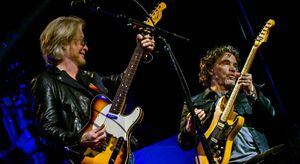Top-selling duo in pop music history are back
Legendary double act Daryl Hall & John Oates have enjoyed a remarkable spell of touring. They’ve been on the road in recent years, playing such legendary venues as Madison Square Garden and The Forum.

And now they’re ready to bring their show back to the UK for their first tour since July 2015. They’ll play Birmingham’s Resorts World Arena on Wednesday, which is their first European gig since a triumphant sell-out headline set at The O2 for Bluesfest in 2017.
KT Tunstall will be performing before Hall & Oates, following the release of her acclaimed sixth studio album ‘WAX’ in October.
Daryl Hall is thrilled to be back in Britain. “I’ve been in and out of the UK for a lot of years and it’s always great to come home. I can’t wait to play these shows.”
From the mid 70s to the mid 80s, Daryl Hall and John Oates scored six #1 singles, including “Rich Girl” (also #1 R&B), “Kiss on My List,” “Private Eyes,” “I Can’t Go For That (No Can Do) (also #1 R&B), “Maneater” and “Out of Touch” from their six consecutive multi-platinum albums – 76’s Bigger Than Both of Us, 80’s Voices, 81’s Private Eyes, 82’s H2O, 83’s Rock N Soul, Part I and 84’s Big Bam Boom.
The era also produced an additional five top 10 singles, “Sara Smile,” “One on One,” “You Make My Dreams,” “Say It Isn’t So” and “Method of Modern Love.” In 1987, the RIAA recognized Daryl Hall and John Oates as the top-selling duo in pop music history, a record they still hold today.
These days, fans are so pleased to see the double act that they get standing ovations before the end of a show.
Hall says: “It happens periodically throughout the show. It depends on what song we’re playing, it depends on how well we play it. It depends on the vibe of the audience. We really have so many songs that are still so popular. They’re such big hits, and these are the songs people come to share and hear.”
And yet, despite being showered with affection in recent times, it wasn’t always so. Hall & Oates had more than their fair share of negative reviews. Oates said: “It’s interesting. Our relationship with the press had its ups and downs. At first, we were darlings of the rock press. We were underground, hip and undiscovered. But as time went on, they decided they didn’t like us so much. You can’t expect everyone to like you. All I cared about was making the best records we could. Daryl felt the same way. Those songs have stood the test of time, so what’s going on now feels special.”
Now that the band are back on the road, their set list pretty much takes care of itself. “In a sense, we’re bound by our success. We have the most incredible amount of hit records that people really wanna hear. But at the same time, we have a catalogue of over 400 songs. Some of them are very interesting musically, but we only have so much time.
“It’s our professional responsibility to play the songs people wanna hear, but we also do what we wanna do. We balance it between album tracks, hits, and the way we stretch, evolve and modernise those hits in some ways. At our shows, you’re hearing the records you wanna hear, but not necessarily exactly like they are on record. That’s really what we bring. Luckily for us, we’re proud of our hits, so it’s not like we’re playing songs we don’t want to play. If you had a popular song, a hit, that means people like it. And if people like it, why… As long as you like it. If you’re being untrue to yourself, if you really hate the song you wrote, then maybe you should reconsider what you’re doing for a living. I would assume that most bands are pretty proud of what they’ve made.” Hall has chronicled his life in a memoir called Change of Seasons, which gave him the opportunity to reflect on a remarkable life.
“It did make me think back into those deep memories. I began to recall things I hadn’t thought about. What I discovered: I found the ’70s and the process of becoming Hall & Oates much more interesting than talking about the ’80s and the big commercial success we had. I found the ’70s way more interesting and more exciting, more vivid in my mind. The ’80s, to me, were just a big blur. Running around the world, touring, recording videos – we never really had time to stop and reflect. Whereas in the ’70s, things were much slower. We were figuring out who we were going to be as musicians. We were driving around the country, it had a much more romantic feel to it. In my book, I really unpack the ’70s.”
Hall believes his success has given him the opportunity to enjoy an extended adolescence. And he says that the pressures of fame are the reason that Hall & Oates dropped out of the loop for a while.
“We didn’t want to be MTV has-beens. We just stopped. We stopped touring, we stopped recording. And when we came back to recording, we made different types of records. I think we found a way to preserve ourselves. Now, we’re more successful than we’ve ever been. There’s been a rediscovery of our music by a younger generation. In a way, it’s a vindication of the quality of music we have.”





